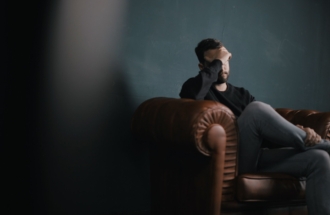I straightened my tie and rang the doorbell, eager to reconnect with old friends and colleagues at a housewarming party. Just before the host answered the front door, I noticed a yard sign for a popular home security company. I’d been curious about security systems, so after passing off the bottle of Pinot, I asked my friend if he was happy with his.
“Oh, we don’t actually pay for it,” he told me with a chuckle. “We just kept the previous owners’ sign in the yard when we moved here to keep intruders at bay.”
I had to laugh because I could see myself doing the same thing: relying on the illusion of control to increase my own sense of security.
It’s only natural to do whatever we can to be in “control.” In fact, I’d venture to say it’s human nature, especially when times are stressful.
Take dogs, for example. Research shows that more American families owned aggressive dog breeds — the original security system — during the tumultuous late 1960s, compared to the relatively serene late-1950s. (Even though a “Beware of Dog” sign may have had the same effect.)
And decades earlier, during the Great Depression, authoritarian churches saw a two-thirds increase in attendance compared to less economically-challenging periods of the 20th century.
The point is: we want to feel like we’re in charge of our own destinies. So to allay our anxiety about the future, we fixate on doing the “right” things in the here and now.
But what happens when the thief breaks in, in spite of your careful planning? What happens when you realize that no security system, aggressive dog breed, or church congregation can protect you from the difficulties of life?
What happens when you realize you aren’t in control at all?
The illusion of control
There will always be elements of our lives that we can’t control, no matter how carefully we plan. Difficulty and pain will always be a part of our existence, and to resist them is like resisting the sunrise or the changing of seasons—it’s simply not possible.
Still, many of us spend our lives attempting to dodge vulnerability. We’d rather live under the illusion that we’re directing every outcome than face the reality that life is unpredictable (and often, painful and messy).
The poet David Whyte writes:
“Although we may intellectually recognize how essential vulnerability is to our aliveness and every significant expression of it, we remain astonishingly averse to being vulnerable, expending tremendous resources on constructing elaborate and ultimately illusory defenses against this basic condition of being alive.”
While our attempts to prevent vulnerability make us feel safe, they’re actually quite counterproductive — and even harmful. Because trying to control our lives keeps us from enjoying the things we’re trying to protect in the first place.
Let’s say you’re worried about protecting your family, which is a noble concern. But that concern begins to grow and soon consumes your life. You spend all your free time building a tall fence so no one can harm your loved ones. When that’s done, you devote your energy to researching the fanciest security systems available.
Before you know it, your kids are grown — and because you were so focused on making sure nothing terrible happened, you missed out on precious time with them.
And even worse, by trying desperately not to be a victim, you actually become one.
“Since your freedom depends on the person or thing you want to control, the person or thing gets to decide how you feel,” writes Yong Kang Chan.
“So aren’t you being a victim and being controlled by the person or thing?”
Remember, no matter how frightening future outcomes seem, anxiety about tomorrow doesn’t prevent bad things from happening. It only distracts you from what you have right now: the present.
Philosophy professor Massimo Pigliucci sums it up well when he asks:
“What do you gain by being anxious over something you don’t control? Or angry at a result that was not your doing? You are simply adding a self-inflicted injury to the situation, compromising your happiness and serenity.”
Embracing risk
By focusing on preventing bad things, you’ll inherently miss out on making good things happen.
Vulnerability is a prerequisite to being human. We need it to connect with others, to make art, and to generate the next culture-shifting idea. Without vulnerability, there is no risk, and without risk, there is no growth.
“I spent a lot of years trying to outrun or outsmart vulnerability by making things certain and definite, black and white, good and bad,” writes sociology researcher and author Brene Brown.
“My inability to lean into the discomfort of vulnerability limited the fullness of those important experiences that are wrought with uncertainty: Love, belonging, trust, joy, and creativity to name a few.”
While a lack of vulnerability will keep you from connecting with yourself and other people, it also keeps you from connecting with the person you want to be.
That’s because improving your life requires being proactive. Control, on the other hand, is all about reactivity. Put another way: If an entire soccer team were on defense, how could they score any goals?
Think back to the last time you had a big “win” in your professional or personal life. Maybe you brought a bold idea to your boss and weren’t sure if she’d like it. Maybe you submitted an article for publication, knowing it could be rejected.
Either way, the “win” took guts, right? Your biggest accomplishments in life will emerge from equal parts effort and surrender — doing your best to positively influence a situation while being willing to risk something negative.
The one thing we can control
We will never be the authors of our own destinies. That’s a hard pill to swallow. So rather than attempting to disaster-proof every area of our lives, we’d be better off exploring what we can control: our own responses to the few-and-far-between disasters.
Maybe someone will break into your house, even though you planted a security sign in the yard. Maybe your boss will hate your idea, despite the long hours you spent preparing the presentation.
What will you do when the bad news arrives? How will you respond? Hopefully, you’ll grow.
Instead of obsessively trying to prevent negative outcomes, save your energy for recovering from those outcomes when they do happen. By reconciling with the reality that life might come with some lemons — and learning how to make lemonade — you’ll not only become more resilient in the long run, but you’ll also be more creative.
Realizing you’re not in control of your circumstances can provoke anxiety. It’s a new way of thinking, and it’s uncomfortable for me sometimes, too.
But when you consider it from another perspective, losing control is also freeing. When you don’t waste your mental energy on micromanaging the details of your life, you can use that energy to invest in more valuable things — like becoming the person you want to be.















Send Comment: